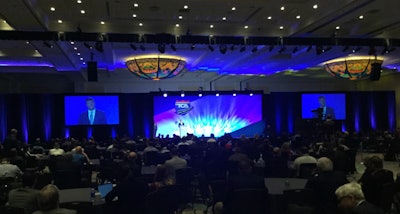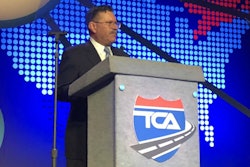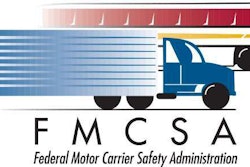
Changes to the federal regulations that govern how many hours truckers may drive each day have taken a step closer to being changed.
Speaking at the Truckload Carriers Association annual convention in Kissimmee, Florida this morning, March 3, Federal Motor Carrier Safety Administration Acting Administrator James Mullen announced the final rule was sent last night to the White House Office of Management and Budget. By law, the OMB has 90 days to rule on the proposed regulation, but there’s a provision that allows that to expand to 120 days.
 FMCSA Acting Administrator Jim Mullen
FMCSA Acting Administrator Jim Mullen“While I can’t go into the specifics of this final rule, please know that the goal of this process from the beginning has been to improve safety for all motorists and to increase flexibility for commercial drivers,” Mullen told the filled ballroom at the Gaylord Palms Resort. Talking to reporters after his speech Mullen said he would not and could not attempt to guess how the OMB might react to the proposed changes.
FMCSA’s proposed hours of service reforms, published last August, called for several changes to existing hours of service regulations, all of which then Administrator Ray Martinez said would provide greater flexibility to drivers. Chief among them was the ability for drivers to pause their 14-hour on-duty clock one time and go off-duty for up to three hours. It also provided the option for drivers to extend their 14-hour clock by two hours if they face adverse conditions such as traffic or weather.
If the OMB approves the rule, the next step would be for FMCSA to publish the rule in the Federal Register and set an implementation date.
In his address to TCA, Mullen emphasized the importance of the hours of service changes. He said, “It’s my priority, it’s the priority of the Secretary (of Transportation Elaine Chao), it’s the priority of this Administration to get these modifications finished.”
Mullen also touted the success of the agency’s recently opened Drug and Alcohol Clearinghouse. He said more than 680,000 drivers have been entered into the database, and that 9,000 drivers who have failed or refused testing have been identified. He said this is critical to highway safety.
The former Werner executive also touched on the success of the mandated electronic logging device regulation. Since becoming mandatory, there has been a 52% reduction in hours of service violations and that during roadside inspections less that one percent of drivers are non-compliant with ELD use.
He also recapped the pilot program for 18-20-year-old military veterans to drive interstate. He said 40 companies have signed up to participate, but there have been relatively few young drivers participate. The goal is to have 200 drivers in the pilot program.
During a Q&A session, an attendee said the process of filing a DataQ accident review, by which FMCSA can clear drivers and carriers when it can be determined that an accident was non-preventable, is “cumbersome, too long – when can you fix it?” Mullen said over 90% of the reviewed cases were deemed non-preventable, “so the program’s working.” Nevertheless, Mullen said the process is cumbersome and the agency is working to improve it.
The TCA convention concludes tonight with the annual banquet during which the company driver and owner-operator of the year will be announced.












